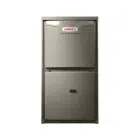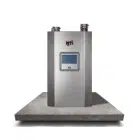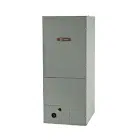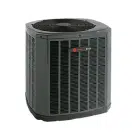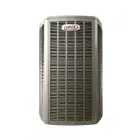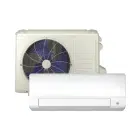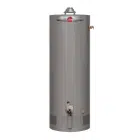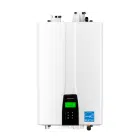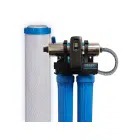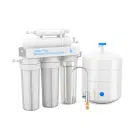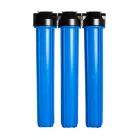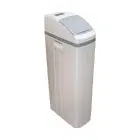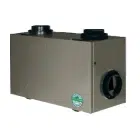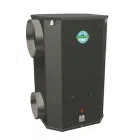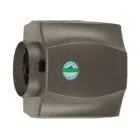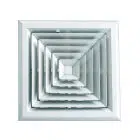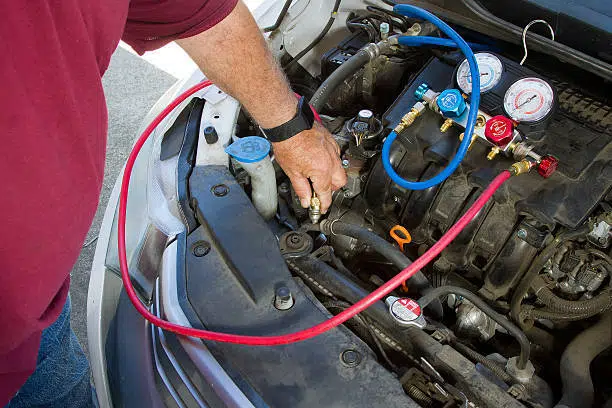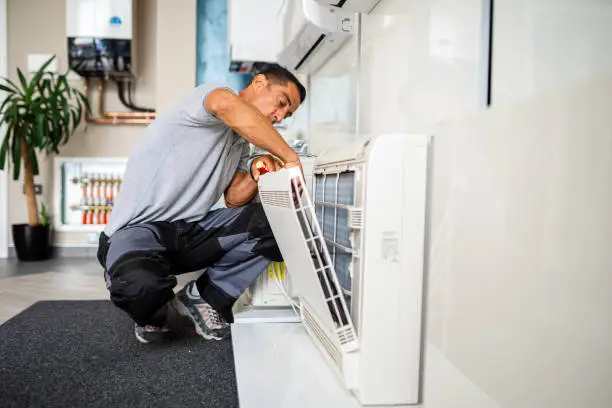
Table of Contents
Air conditioner coils are essential components of any cooling system. These coils play a pivotal role in the heat exchange process, which is fundamental to the operation of an air conditioner. Over time, coils can accumulate dirt, dust, and debris, which can significantly impair their efficiency.
This article will explore the different types of air conditioner coils, their functions, and provide a comprehensive guide on how to clean air conditioner coils effectively. Regular air conditioner maintenance, including proper cleaning, can enhance the performance and longevity of your air conditioning system.
Types of Air Conditioner Coils
Evaporator Coils
Evaporator coils are located inside the indoor unit of an air conditioning system. These coils are responsible for absorbing heat from the indoor air, which is a crucial step in the cooling process. When the refrigerant passes through the evaporator coils, it evaporates and absorbs heat from the air, cooling it down before it is circulated back into the room. The cooled air is then blown through the ducts and into the living spaces, providing a comfortable indoor environment.
The evaporator coils are typically configured in an A-frame shape to maximize the surface area for heat exchange. This design allows the coils to effectively remove heat from the air as the refrigerant circulates through them. The efficiency of this process is critical for maintaining the desired indoor temperature and ensuring the overall performance of the air conditioning system.
Common Materials
Evaporator coils are typically made from materials like aluminum and copper due to their excellent thermal conductivity. Copper is preferred for its superior heat transfer properties, while aluminum is favored for its cost-effectiveness and corrosion resistance.
- Copper Coils: Copper coils offer high thermal conductivity, which allows for efficient heat transfer. This material is durable and can withstand high pressures, making it a reliable choice for long-term use. However, copper coils are generally more expensive than aluminum coils, which can increase the overall cost of the air conditioning unit.
- Aluminum Coils: Aluminum coils are less expensive and lighter than copper coils. They offer good thermal conductivity and are resistant to corrosion, which is particularly beneficial in humid environments. However, aluminum is not as efficient in conducting heat as copper, which can affect the overall efficiency of the air conditioning system.
Advantages and Disadvantages
Each material used for evaporator coils has its pros and cons, impacting the overall efficiency and cost of the air conditioning unit.
Copper Coils:
- Advantages: High thermal conductivity, durable, reliable under high pressure.
- Disadvantages: More expensive, can be prone to corrosion if not properly maintained.
Aluminum Coils:
- Advantages: Cost-effective, lightweight, corrosion-resistant.
- Disadvantages: Lower thermal conductivity compared to copper, can be more challenging to repair if damaged.
For professional consultation on identifying the type of air conditioner coils you have and how to clean them, please contact us through the link below. Our team of experienced HVAC specialists is ready to assist you with any information and provide recommendations to ensure your air conditioner operates efficiently and reliably.
Why Clean Air Conditioner Coils Regularly?
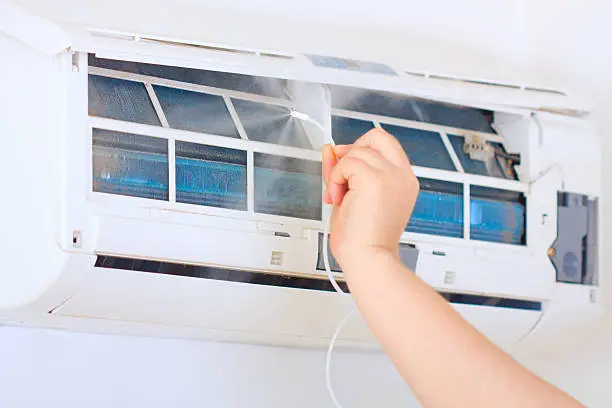
Dirty coils can significantly reduce the efficiency of an air conditioning system. When dirt and debris accumulate on the coils, they act as an insulating layer, preventing the coils from effectively absorbing or releasing heat. This results in the system working harder and consuming more energy to maintain the desired temperature, leading to higher utility bills.
Regularly cleaning air conditioner coils can prevent unexpected breakdowns and costly repairs. Dirt and debris can cause the coils to overheat and lead to system malfunctions. By maintaining clean coils, you reduce the risk of component failure and extend the lifespan of your air conditioning unit.
Check out the most common air conditioner problems & solutions in our previous article via the link below.
https://thehvacservice.ca/air-conditioner-troubleshooting-most-common-problems-solutions/
How to Clean Air Conditioner Coils
As we told you before, regular cleaning of air conditioner coils is essential to maintain the efficiency and longevity of your cooling system. Below is a detailed guide on how to clean air conditioner coils effectively (both evaporator and condenser).
Safety First
- Turn Off the Power
Before starting any cleaning process, ensure that the power to the air conditioning unit is turned off. This step is crucial to prevent electrical accidents and ensure your safety while working on the system.
- Protective Gear
Wearing protective gear such as gloves and safety glasses is recommended to protect yourself from any sharp edges or chemicals used during the cleaning process.
Cleaning Evaporator Coils
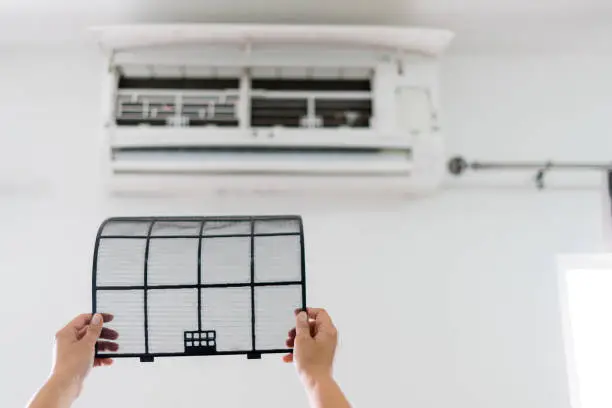
- Accessing the Coils
To clean the evaporator coils, you first need to access them by opening the indoor unit. This may involve removing the access panel or other components, depending on the design of your air conditioning system. Refer to the manufacturer’s manual for specific instructions.
- Using a Brush
Start by using a soft-bristle brush to gently remove loose dirt and debris from the coils. Be careful not to damage the delicate fins of the coils during this process.
- Applying a Cleaning Solution
Use an AC coil cleaner specifically designed for evaporator coils. Spray the air conditioner coil cleaner evenly over the coils and allow it to sit for the recommended time as per the product instructions. The air conditioner coil cleaner will break down and loosen any remaining dirt and grime.
- Rinsing the Coils
After the AC coil cleaner has done its job, rinse the coils thoroughly with water. Ensure that the water pressure is not too high to avoid damaging the coils. Allow the coils to dry completely before reassembling the unit.
- Reassembling the Unit
Once the coils are clean and dry, carefully reassemble the unit, ensuring all components are securely in place. Restore the power and check the system to ensure it is operating correctly.
How to Clean Air Conditioner Coils
- Clearing Debris
Start by clearing any debris from around the outdoor unit. This includes removing leaves, grass clippings, and other obstructions that could interfere with airflow.
- Using an AC Coil Cleaner
Apply the air conditioner coil cleaner to the condenser coils, following the product instructions. Allow the coil cleaner to penetrate and break down the dirt and grime.
- Hosing Down the Coils
Gently hose down the coils to rinse away the AC coil cleaner and any loosened debris. Be sure to use a gentle spray to avoid damaging the coils.
- Inspecting for Damage
After cleaning, inspect the coils for any signs of damage, such as bent fins. Use a fin comb to straighten any bent fins, ensuring optimal airflow through the coils.
By following these steps, you can ensure that your air conditioner operates at peak performance, reducing energy consumption and preventing costly repairs. However, for a thorough and professional cleaning, or if you encounter any issues, it’s best to contact experts.
Our HVAC Service Solutions company offers specialized cleaning services to keep your air conditioning system in top shape. Our experienced technicians use the latest tools and techniques to ensure your coils are perfectly clean and your system runs smoothly.
Conclusion
Regular maintenance and cleaning of air conditioner coils are crucial for the efficient and effective operation of your cooling system. By understanding the different types of coils and how to properly clean them, you can improve your system’s performance, reduce energy costs, and extend its lifespan. However, for more complex issues or thorough maintenance, professional services are recommended.
If you need assistance or professional air conditioner coil cleaning services, contact our HVAC Service Solutions company in Canada. Our team is ready to help you maintain a comfortable and energy-efficient home.
Frequent Asked Questions
Why is it important to clean air conditioner coils?
Cleaning air conditioner coils is crucial for maintaining the efficiency and performance of your cooling system. When coils become dirty, they cannot effectively absorb or release heat, which makes your air conditioner work harder to cool your space. This increased workload leads to higher energy consumption, raising your utility bills. Additionally, dirty coils can cause the system to overheat, potentially leading to component failures and costly repairs. Regular cleaning helps to ensure optimal heat exchange, prolongs the lifespan of your system, and maintains indoor air quality by reducing the amount of dust and allergens circulated by the unit.
How often should I clean my air conditioner coils?
It is generally recommended to clean your air conditioner coils at least once a year, ideally before the start of the cooling season. However, the frequency can depend on several factors, including your local climate, air quality, and how often you use your air conditioner. In areas with high levels of dust, pollen, or pollution, or if you have pets, more frequent cleaning may be necessary. Regular inspections can help determine if cleaning is needed more often. If you notice a decrease in cooling efficiency or an increase in energy bills, it might be time to clean the coils.
What is the difference between evaporator coils and condenser coils?
Evaporator coils and condenser coils serve different functions in the cooling process of an air conditioner. Evaporator coils are located inside the indoor unit and are responsible for absorbing heat from the indoor air. As the refrigerant passes through the evaporator coils, it evaporates, absorbing heat from the air, which cools the air that is then circulated back into the room. Condenser coils, on the other hand, are found in the outdoor unit. Their job is to release the absorbed heat into the outside air. As the refrigerant flows through the condenser coils, it releases heat and condenses back into a liquid. This continuous cycle of heat absorption and release is what keeps your indoor environment cool.
Can I clean the coils myself, or do I need a professional?
You can clean the air conditioner coils yourself if you follow proper steps and safety precautions. DIY cleaning involves turning off the power to the unit, using a soft brush or a vacuum to remove loose dirt, and applying an air conditioner coil cleaner to dissolve grime. However, it’s essential to be careful to avoid damaging the delicate fins of the coils. For heavily soiled coils, or if you’re not comfortable performing the task, it’s advisable to hire a professional HVAC technician. Professionals have the right tools and expertise to thoroughly clean the coils, check for any potential issues, and ensure that your system is operating at its best.
What type of cleaner should I use for my air conditioner coils?
For cleaning air conditioner coils, it’s best to use a coil cleaner specifically designed for HVAC systems. These cleaners are formulated to safely and effectively dissolve dirt, grease, and grime without damaging the coils. They are usually available in foam or liquid form and can be applied directly to the coils. Foam cleaners expand to cover a larger area and can penetrate deep into the coils to break down stubborn deposits. Always follow the manufacturer’s instructions for application and rinsing. Avoid using household cleaners, as they may contain chemicals that can damage the coils or leave residues that attract more dirt.
What are the common materials used for air conditioner coils?
Air conditioner coils are typically made from copper or aluminum, each with its own advantages and disadvantages. Copper coils are known for their excellent thermal conductivity, which means they can transfer heat efficiently, enhancing the system’s performance. They are also durable and can withstand high pressures, but they are more expensive and can be prone to corrosion if not properly maintained. Aluminum coils are lighter and generally less expensive than copper coils. They are resistant to corrosion, which can be beneficial in humid or coastal environments. However, aluminum is not as efficient at conducting heat as copper and can be more challenging to repair if damaged.
What are the signs that my air conditioner coils need cleaning?
There are several signs that indicate your air conditioner coils may need cleaning. One of the most common signs is a noticeable decrease in cooling efficiency—if your air conditioner is running longer or struggling to cool your space, dirty coils could be the culprit. Increased energy bills without a corresponding increase in usage can also indicate that the system is working harder due to dirty coils. Additionally, if you see visible dirt, dust, or debris on the coils, they need cleaning. Other signs include reduced airflow from the vents, a musty smell coming from the unit, or frequent system cycling (turning on and off).
What happens if I don’t clean my air conditioner coils?
Neglecting to clean your air conditioner coils can lead to several problems. Dirty coils cannot effectively transfer heat, causing the system to work harder and less efficiently, which increases energy consumption and utility bills. Over time, this added strain can cause the system to overheat, leading to premature wear and potential component failures. The buildup of dirt and debris can also lead to poor indoor air quality, circulating dust and allergens throughout your home. In severe cases, dirty coils can cause the refrigerant to freeze, resulting in a complete system shutdown. Regular cleaning helps to avoid these issues and maintains the system’s reliability.
How do I access the evaporator coils for cleaning?
To access the evaporator coils for cleaning, you typically need to remove the access panel of the indoor unit. Begin by turning off the power to the air conditioning system to ensure safety. The access panel is usually secured with screws or clips, which you can remove using a screwdriver. Once the panel is off, you should see the evaporator coils. Be cautious when handling the unit, as the coils are delicate and can be easily damaged. Consult your air conditioner’s manual for specific instructions related to your model, and if you’re unsure or uncomfortable, consider hiring a professional.
What should I do if I notice damage to my coils during cleaning?
If you notice any damage to your air conditioner coils during cleaning, such as bent fins, corrosion, or leaks, it’s important to address these issues promptly. Bent fins can often be straightened using a fin comb, a tool designed specifically for this purpose. However, if the damage is extensive, such as significant corrosion or refrigerant leaks, it’s best to call a professional HVAC technician. Attempting to fix these problems on your own can be risky and may cause further damage to the system. A professional can accurately diagnose the issue and perform the necessary repairs to restore the system’s efficiency and prevent further damage.
Share

